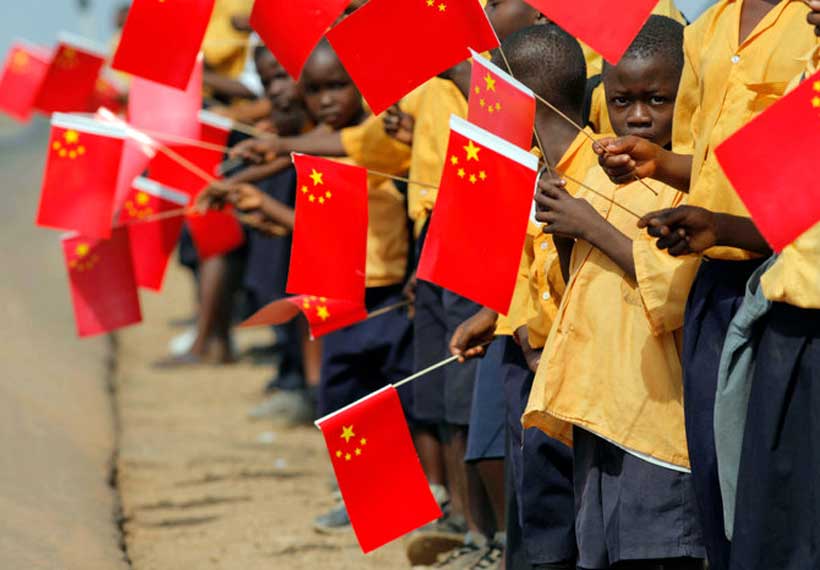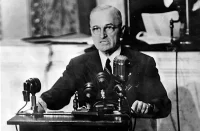Part I, Part II, Part III, Part IV
The English language as soft power
Language is the general term for human vocal (and as well as written and signed) communication. Since languages differ appreciably from each other, they, therefore, form highly effective markers of different cultures and different ethnic groups or nations. It is, consequently, not surprising that ethnic groups and nations use distinct languages in both a highly conscious and effective fashion as markers of their distinct identities but and as a proper instrument of soft power to promulgate some ideas or values of their own culture or political orientation to others. Surely, different languages are universal markers of different ethnic groups and nations. It is a very matter of fact that a high proportion of European ethnic groups and nations are bearing names that resemble strongly, or are virtually identical to, the names of their languages. In addition, in many cases, distinct languages are by far the clearest feature distinguishing one nation or ethnic group from its neighbors.
Human beings are the most mobile of the larger land mammals, and even if only moving on foot, a single human group can spread out within a few years into an area of hundreds of square km. Bearing in mind this, languages, like other human cultural characteristics, became diverse. Taking into consideration the fact that languages change constantly, at the beginning small but later large differences can develop between different groups of language-users, and these differences can be used to mark regional and social distinctions. However, unlike other cultural characteristics, languages fulfil the role of essential media of communication and, therefore, cannot become too diverse if communication is to be maintained. Nevertheless, until recent times, communication took place for most people almost entirely within a local or family group. This meant that, if an original single group became divided through migration, there was little to prevent an original fairy uniform language diverging so much that communication between the two new groups became difficult or even impossible. It can be seen, consequently, how different languages can arise, and how they can become markers of different ethnic groups and different nations. Nonetheless, in many practical cases, intercommunication between different ethnolinguistic groups can be maintained by the use of the third language of mediation – today, for instance, English.[i]
 Language is one of the focal factors that may contribute to reinforcing cultural self-consciousness on one hand and to promulgate soft power on another. Today, it is quite related to the role of English as a contemporary lingua franca. However, there is a prediction of ultimate declination of English in the future for several (political, social, cultural, technical, and economic) reasons:
Language is one of the focal factors that may contribute to reinforcing cultural self-consciousness on one hand and to promulgate soft power on another. Today, it is quite related to the role of English as a contemporary lingua franca. However, there is a prediction of ultimate declination of English in the future for several (political, social, cultural, technical, and economic) reasons:
- The global movements towards democratization in politics or equality in society will undermine the status of elites, who are the major users of English as a non-native language. Therefore, the English language may slowly retreat to its native-speaking territories.
- The economic, political, and military rise of the BRIC states (Brazil, Russia, India, and China) will challenge the dominance of native-English-speaking nations, and consequently, reduce the international preference for English as an instrument of soft power primarily used by the USA and the UK after WWII.[ii]
- The progress of new technologies and instant translation among major languages (for instance, by Google Translate) is gradually enhancing the status of mother tongues and lessening the necessity for any future lingua franca.[iii]
Nevertheless, English, without any doubt, is and will continue to be the most widely spoken language in the recent future. Therefore, English will be still used for some time as a proper cultural instrument for the promulgation of the soft-power by Washington and London but, however, it is supposed that its dominance as global lingua franca is coming to be challenged by other competing languages. Consequently, the focal question arises: What are its implications for the current soft power configuration?
Diffusion of loyalties
We have to keep in mind that we should give special attention to the fact of diffusion of loyalties among different actors. There are two applications of this truth. First, it highlights the importance of soft power in the process of achieving certain goals in the multi-international world. Second, it as well as at the same time increases the difficulties of soft use of power, concerning the global emergence of cultural relativism. However, it can be said that this is in essence a paradox of soft power in a globalized world. At any cost, cultural dialogue rather than cultural confrontation is quite urgent for public diplomacy, as well as soft power building.
China’s soft power
It is of extreme importance to understand the concept and motivation of soft power by China – the most arising emerging market power today and already the first export nation with the second-largest economy in the world.
Concerning China and its foreign policy, soft power is one of the most frequently used political and social concepts during the last two decades. It has to be immediately noticed that one of the major reasons for China’s easy acceptance of soft power is that soft use of power has historically a strong cultural foundation in traditional Chinese foreign policy (for instance, in the case with the Korean Peninsula). Traditional China has a rich military-free culture, which mostly contributes to China’s use of cultural power in its foreign relations.[iv] The revival of material and cultural power prompts China to easily find an echo in the concept of soft power. As a fact, all ethnic Chinese people are proud of their cultural history.
Given that soft power is highly related to culture, it can be said that it is natural that China should stress the importance and use of cultural and soft power concerning its competitive cultural advantage in international society. Additionally, for most Chinese political and economic elites, the factor of civilization is playing a key role in shaping the future global order of world politics. In other words, in the eye of the Chinese elite, the way civilizations shape world order is not through clashes, as Samuel P. Huntington claims (a Theory of Clash of Civilizations), but through dialogue between them. Such belief in civilization as well as is reinforcing the Chinese emphasis on soft power. Another reason for it is that Chinese society is fundamentally a relation-based society. In means, practically that social power is originating mostly, but not entirely, from the density of relational networks. Social power should be used for strengthening rather than disrupting the balance of social relations. Such a particular understanding of power is as well as consistent with the nature of soft power.
 Some principles relating to Chinese use of soft power in foreign policy could be summarized briefly as follows:
Some principles relating to Chinese use of soft power in foreign policy could be summarized briefly as follows:
- At the cultural level, people from different cultures and civilizations should be mutually appreciated through communication. Diplomacy is, therefore, understood by the Chinese political authorities to be a useful means to reduce tensions among different civilizations.
- At the economic level, China prefers to use persuasive rather than coercive means in order to address political disputes. In practice, in many cases, China insists that disputes cannot easily and simply be resolved through economic sanctions.
- At the societal level, soft power building should help to establish mutual social assistance systems in international areas. That is why China is stressing the importance of transnational societal linkage in a globalized world.
It has to be emphasized that most citizens of China like officials and scholars are fully aware of the great gap in terms of soft power capacity between China and the USA. There is an opinion when the long line at the USA embassy visa application window in Beijing starts to get shorter, this may well mean that the soft power gap between China and the USA has become more balanced. In a soft power survey in East Asian countries in 2008, for instance, the Chicago Council on Global Affairs showed that the USA has much more soft power than China in East Asia. Even more, China’s soft power, in some indices, was even weaker than that of South Korea and Japan.[v] Through the opposite lens, with the growing wave of China-craze and businessmen’s rush to China, however, is it accurate to think that China is facing an unprecedented opportunity to upgrade its soft power around the globe?
It is frequently reported that China’s image in Africa, compared with its image there before the reform program started in 1979, is quite mixed. On one hand, China greatly increased its official aid to several African states, but on the other hand, its image is more or less damaged by some Chinese companies’ profits-before-everything activities there (that is the same with many Western companies too).
Several indicators is showing that China’s soft power is increasing in Asia and the rest of the world during the last twenty years but particularly after the 2008 global financial crisis that started in the USA.[vi] From that time onward, soft power has become a keyword in Chinese foreign policy as there is great potential for the development of China’s soft power.[vii] It has to be noticed that in many countries of developing world of emerging market economies Chinese formula of authoritarian government and successful market economy (China’s tripling of its GDP over 30 years) has become more popular than the previously dominant American formula of liberal market economics with democratic government. However, from a general point of view, even if the authoritarian growth model produces soft power for China in authoritarian countries, it does not produce attraction in democratic countries. In other words, what attracts in Venezuela, may repel in France.[viii] But many Western nations are losing their image and soft power in developing countries in their race with both China and Russia because of their neo-imperialistic policies recognized as such by ex-Western colonies in Africa, Latin America, and Asia. For instance, the G. W. Bush (Junior) administration’s general tendency towards unilateralism and in particular its approach to the “war on terror” damaged the USA’s soft power and bred resentment, particularly within the Muslim world. This US unilateralism was dramatically demonstrated by the USA’s 2003 invasion of Iraq. Indeed, the then UN Secretary-General, Kofi Annan, declared explicitly that, as the invasion had not been sanctioned by the OUN SC, and was not following the principles of the UN Charter, it was a clear breach of international law (like NATO’s aggression on the Federal Republic of Yugoslavia in 1999). The 2003 Iraq War demonstrated how the OUN could be reduced to the role of a bystander in a world dominated by the hegemonic USA. However, such action undoubtedly weakened the USA’s soft power.[ix]
Instead of placing weight only on the economy and material resources, for the application of soft power, the future of China’s soft power will depend on what kinds of ideas China can contribute to the world, especially under the current uncertain international conditions and global rivalry between China and the USA and the USA and Russia. The most significant challenge to US power and global hegemony is the rise of emerging market states (like BRIC) but especially China. In general warnings about the decline of US global hegemony date back after the Vietnam War and the Iranian Islamic revolution. The rise of China is, nevertheless, the most significant phenomenon in IR during the last 40 years, suggesting the emergence of a new global hegemon, with China, set to overtake the USA in economic terms during the 2020s. Although China’s global power is very closely related to its economic resurgence, its influence is as well as growing in other respects. China has by far the largest army in the world and is second only to the USA in terms of military spending. Chinese influence over Africa, in particular, has expanded considerably due to massive financial investment, linked to securing supplies of energy and raw materials. China’s structural power is as well as growing, as is reflected in the growing influence of the G-20, its role within the WTO, and the fate of both the 2009 Copenhagen climate change and the 2021 Glasgow climate change conferences. China’s soft power is linked to its association with anti-colonialism and its capacity to portray itself as the representative of the global South. On other hand, the USA’s soft power has declined in several respects. Its reputation has been damaged by its association with corporate power and widening global inequality, resentment developing against “globalization as Americanization”. Serious damage has also been done to the USA’s moral authority by the military invasion of Iraq and by the terrible treatment of prisoners at Abu Ghraib and the Guantanamo detention camp.
Reposts are welcomed with the reference to ORIENTAL REVIEW.
References:
[i] See more in [R. Wardhaugh, Languages in Competition, Oxford: Blackwell, 1987].
[ii] The member states of the BRIC organization are in both demographic and economic terms among the largest countries in the world. In financial terms, the BRIC countries also dominate the emerging market economies. With an average annual growth rate close to 10% since 1980, China definitely meets all the criteria for an emerging market economy. It is followed by India and Brazil with average annual growth rates of respectively 5.8% and 2.4%. Since 1998, Russia has also seen high growth, now at the same level as India. For comparison, the average annual growth since 1980 in seven of the large industrialized countries in the world (G7) was 2.7%. As a matter of fact, global interest has so far concentrated mainly on China’s economic development, with the other three BRIC countries playing a secondary role. The long period of sustained high growth in China and India indicates that these countries have succeeded in creating the basis for a “tiger leap” in growth that so far has proved to be sustainable. The Russian economy is based on oil and gas production and mineral extraction and is, therefore, sensitive to price trends for these raw materials. Brazil has enjoyed some periods of high growth, but so far with no signs that these bursts of growth could become permanent. Mineral extraction is also a key element of Brazil’s economy.
The high growth rates in China and India, and recently also Russia, have increased the BRIC countries’ importance to the global economy. Over the last 15 years, the BRIC countries’ share of the global economy has increased by over 1.8% points. In terms of GDP at market prices, however, the BRIC countries’ role in the global economy is still relatively small but, nevertheless, growing. Today, they account for approximately 9% of the total global economy, while the seven countries in the G7 group account for 63%. However, taking into consideration GDP growth at market prices and some other economic parameters (like export), the BRIC countries’ share of the global economy is almost 24%, while that of the G& countries falls to just over 43%.
[iii] See more in [Nicholas Ostler, The Last Lingua Franca: English Until the Return of Babel, London: Penguin, 2010].
[iv] See more in [Lei Haizong, Chinese Culture and Chinese Soldiers in History, Beijing: Commercial Press, 2001 (in Chinese)].
[v] Christopher Whitney, David Shambaugh, Soft Power in Asia: Results of a 2008 Multinational Survey of Public Opinion, Chicago Council on Global Affairs [www.thechicagocouncil.org].
[vi] Sheng Ding, The Dragon’s Hidden Wings: How China Rises with Its Soft Power, Lanham: Lexington Books, 2008.
[vii] People’s Daily Online, “How to Improve China’s Soft Power”, 2010-03-11.
[viii] Ingrid d’Hooghe, The Limits of China’s Soft Power in Europe: Beijing’s Public Diplomacy Puzzle, Clingendael Diplomacy Papers, No. 25, Netherlands Institute of International Relations, Clingandel, 2010.
[ix] By definition, soft power is the power of attraction rather than coercion. It is the ability to influence others by persuading them to follow or agree to norms and aspirations that produce the desired behavior, as opposed to using threats or rewards.














Comments